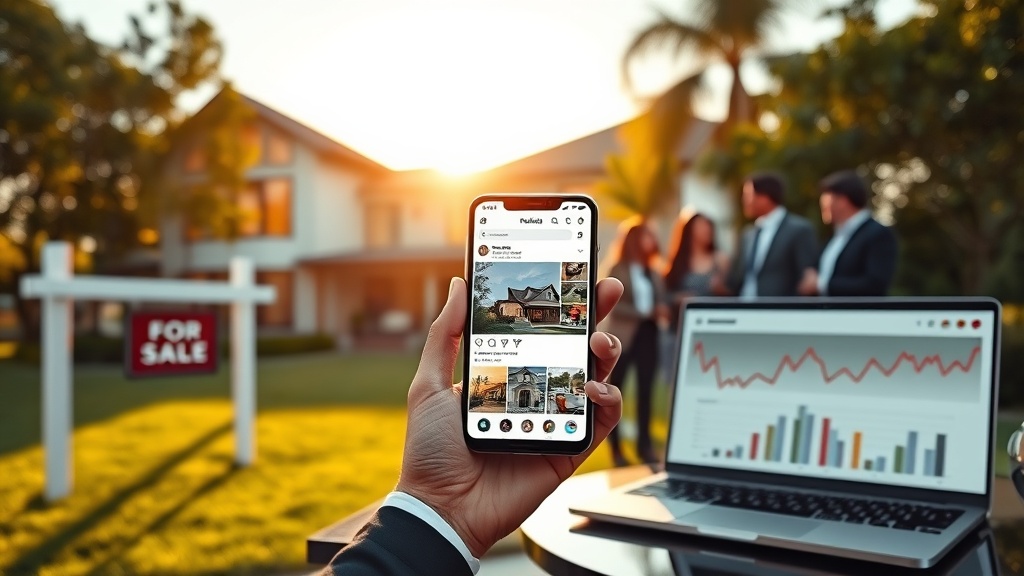The Future of Real Estate Marketing: Trends and Strategies for Social Media

" "
Hello there, fellow real estate enthusiasts! Whether you’re a seasoned realtor or a budding property agent, there’s no denying that the world of real estate marketing is rapidly evolving. Our journey today takes us into the future of real estate marketing with a special focus on social media. Let’s delve into the trends and strategies shaping this exciting landscape.
The Evolution of Real Estate Marketing
Before we dive into the future, let’s take a quick trip down memory lane. Historically, real estate marketing was all about print ads, brochures, and direct mail. Remember those days when a "For Sale" sign in the front yard was the pinnacle of property promotion? Those strategies, while still in use, have given way to digital marketing, driven by the power of the internet.
The Rise of Digital Platforms
With the advent of the internet, real estate marketing took a significant turn. Websites like Zillow and Realtor.com became the go-to resources for property listings. However, the real game-changer was social media. Platforms like Facebook, Instagram, LinkedIn, and now TikTok have become indispensable tools for real estate marketers. Why? Because they offer a direct line to potential buyers and sellers.
Current Trends in Real Estate Social Media Marketing
As we stand on the cusp of 2024, several trends are already shaping the way real estate is marketed on social media. Let’s explore these with some real-world scenarios:
1. Video Content is King
If a picture is worth a thousand words, a video is worth a million. Video content has exploded in popularity, and platforms like Instagram Reels, Facebook Live, and TikTok are thriving because of it.
Real-World Scenario: Imagine a real estate agent showcasing a property via a Facebook Live session. Potential buyers from across the globe can tour the home virtually, ask questions in real time, and get instant feedback. This not only broadens the reach but also personalizes the buying experience.
2. Influencer Partnerships
Influencers are not just for fashion brands anymore. Real estate agents are increasingly collaborating with local influencers to reach a wider audience.
Real-World Scenario: A local influencer with a substantial following on Instagram partners with a real estate agent to promote a new housing development. The influencer's tour of the property, shared through engaging stories and posts, attracts a younger demographic that the agent might not have reached otherwise.
3. Augmented Reality (AR) and Virtual Reality (VR)
Technology is transforming how potential buyers experience properties. AR and VR offer immersive experiences that bring listings to life.
Real-World Scenario: A potential buyer puts on a VR headset and is transported to a property thousands of miles away. They can walk through each room, visualize furniture placement, and even experience different times of day to see how natural light affects the space. This technology can significantly speed up the decision-making process.
4. Targeted Advertising
Thanks to social media algorithms, targeted advertising has become incredibly precise. Marketers can now reach specific demographics based on interests, behaviors, and geographic locations.
Real-World Scenario: A real estate company launches a Facebook ad campaign targeting young professionals looking to buy their first home. The ad is designed to appear only in the feeds of users aged 25-35, who live within a specific city radius, and have shown interest in home-buying content.
5. User-Generated Content (UGC)
UGC is a powerful tool for building trust and authenticity. Encouraging satisfied clients to share their experiences can significantly enhance a brand's reputation.
Real-World Scenario: A family who just purchased a home shares photos of their new space on Instagram, tagging the real estate agent who helped them. Their testimonials, shared with their own followers, serve as genuine endorsements that can influence potential buyers.
Strategies for Future Success
Navigating the future of real estate marketing requires a strategic approach. Here are some strategies to consider:
1. Embrace the Power of Data Analytics
Understanding data is crucial. Tools like Google Analytics and social media insights can provide valuable information about what works and what doesn’t.
- Strategy Tip: Regularly analyze engagement metrics and adjust your content strategy accordingly. Focus on producing more of what resonates with your audience.
2. Prioritize Engagement Over Promotion
Social media thrives on genuine interactions. Rather than bombarding followers with promotional content, focus on building relationships.
- Strategy Tip: Engage with your audience by responding to comments, hosting Q&A sessions, and creating polls. This fosters a sense of community and trust.
3. Diversify Content Types
Not everyone consumes content the same way. Some prefer videos, others like blogs, while some enjoy interactive content.
- Strategy Tip: Mix up your content strategy by incorporating a variety of formats. Experiment with blog posts, infographics, live videos, and quizzes to keep things fresh and engaging.
4. Leverage SEO for Social Content
SEO isn’t just for websites. Optimizing your social media content for search engines can increase visibility.
- Strategy Tip: Use relevant hashtags, keywords, and geotags in your posts. This helps your content reach a broader audience and improves discoverability.
5. Stay Updated with Platform Changes
Social media platforms are constantly evolving. Staying updated with changes, new features, and algorithms is crucial for maintaining an edge.
- Strategy Tip: Follow platform blogs, join online forums, and participate in webinars to keep abreast of the latest developments.
The Implications of Future Trends
As we look ahead, it’s clear that the future of real estate marketing is intertwined with technological advancements and changing consumer behaviors. Here are some potential implications:
1. Greater Reach and Accessibility
With global connectivity at our fingertips, real estate marketing will become more inclusive and accessible to international buyers. This opens up new markets and opportunities for growth.
2. Increased Competition
As more agents harness the power of social media, the competitive landscape will intensify. Standing out will require creativity, authenticity, and a deep understanding of your audience.
3. Demand for Authenticity
Consumers are becoming more discerning about the content they consume. Authenticity will be paramount in building trust and credibility.
4. Rapid Technological Advancements
The pace of technological innovation shows no signs of slowing down. Staying ahead of the curve will be essential for leveraging new tools and platforms effectively.
Conclusion
As we step into the future of real estate marketing, it's evident that social media will continue to play a pivotal role. By embracing new trends, adopting strategic approaches, and leveraging the power of technology, real estate professionals can navigate this dynamic landscape successfully.
It's an exciting time to be in real estate, and with the right strategies, the possibilities are endless. Whether you're an agent, a buyer, or simply an enthusiast, I hope this blog post has provided valuable insights into the future of real estate marketing.
Until next time, happy selling and happy scrolling! ?✨











